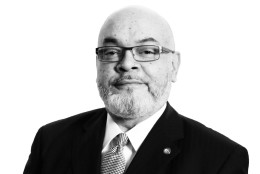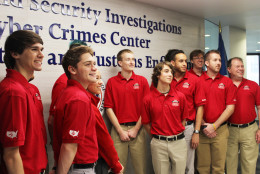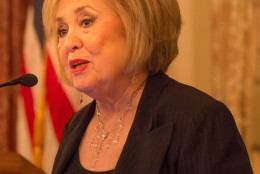Hiring/Retention
-
The number of federal employees under age 30 dropped nearly 3 percent over the past three years. That's according to recent analysis from the Partnership for Public Service and Deloitte. Agencies want to reverse that trend. Tim McManus is vice president for education and outreach at the Partnership for Public Service. He tells In Depth with Francis Rose that some private sector consulting and tech companies are beating agencies at the recruiting game by just showing up first.
August 24, 2015 -
The lack of privacy and quiet is a nuisance to many federal employees. But those with disabilities see the trend toward shared office space in much starker terms.
August 24, 2015 -
Altegrity, USIS’s parent company, agreed to forgo at least $30 million in fees the government owed it in return for not being held liable for alleged violations of the “dumping” or “flushing” security clearances over a 18-year period.
August 20, 2015 -
In late 2009, President Barack Obama ordered agencies to hire more veterans. They have. Veterans used to be confined mostly to the departments of Defense and Veterans Affairs. But the Office of Personnel Management says one out of every three new employees in fiscal 2014 was a veteran. OPM Director of Veterans Services Hakeem Basheerud-Deen tells Federal News Radio’s Emily Kopp how the whole government has stepped up to the challenge.
August 18, 2015 -
The government is getting ready to declare a big win at the end of next month. It looks likely to reach a goal of hiring 100,000 people with disabilities within five years. President Barack Obama set that target in a July 2010 executive order. The Office of Personnel Management's special adviser on disabilities, Michael Murray, tells Federal News Radio's Emily Kopp what happened next.
August 17, 2015 The share of jobs going to veterans has increased steadily each year since President Barack Obama issued an executive order in 2009 to focus efforts on veterans' employment.
August 17, 2015Government officials are starting to brag that, despite budget cuts and hiring freezes, the Obama administration will have achieved an ambitious hiring goal by the end of next month: To add 100,000 new employees with disabilities over a five-year period.
August 17, 2015-
The number of federal employees under age 30 drops from 9.6 percent of the workforce to 6.6 percent over the last five years. And the number of employees under age 25 is down from 2 percent of the federal workforce to 0.9 percent in the same time. That's according to the 2014 Best Places to Work analysis from the Partnership for Public Service and Deloitte. Tim McManus is vice president for education and outreach at the Partnership. He tells In Depth with Francis Rose that recruiting the younger generation is one of agencies' biggest challenges.
August 10, 2015 -
From IT offices to law enforcement bureaus, the federal government says it needs more cybersecurity specialists. But competition is tough. Several federal agencies treated winners of the National Collegiate Cyber Defense Competition as VIPs when they visited Washington in late July. Stops on the tour included the National Security Agency, the Pentagon and the Cyber Crimes Center, part of Immigration and Customs Enforcement's Homeland Security Investigations. Listen to the full story by clicking the button below the slideshow.
August 06, 2015 -
Agencies have problems with recruitment, training, leadership development and succession planning. That's not an outside criticism. It's coming from their own employees. The Partnership for Public Service and Deloitte analyzed the most recent Federal Employee Viewpoint Survey to come up with some ideas for improving the employee experience. David Dye is the director of Federal Human Capital Services at Deloitte. He joined Emily Kopp on the Federal Drive to analyze the latest snapshot.
August 06, 2015 -
New analysis from the Partnership for Public Service of the Office of Personnel Management's Employee Viewpoint Survey shows that low employee satisfaction negatively impacts an agency's ability to hire and retain employees.
August 05, 2015 -
Katrina McFarland, the assistant secretary of Defense for acquisition, said a new report is in the final approval stages that will detail changes to the Defense FAR. The goal is to save the military and industry money from unnecessary procurement rules.
July 29, 2015 -
The House has a number of bills on its calendar this week that, if enacted, could have significant impacts on federal employees and their dependents.
July 28, 2015 -
Gen. Mark Milley said at his confirmation hearing to become the new Army chief of staff that his service still could meet the demand signal for Army forces, despite recent budget cuts. That could change, though, if demands continue to increase and if budgets continue to decrease.
July 22, 2015 -
A bill that makes it easier for the Veterans Affairs Secretary to fire senior executives could extend to all other employees at the department. The probationary period for new employees would also get longer -- from 12 to 18 months. House Veterans Affairs Committee Chairman Jeff Miller says too few people at the department have been held accountable for the patient wait time scandal that emerged into public view last year -- nor for other management failings at VA. The VA Accountability Act of 2015 cleared the committee earlier this week. It will likely go to a full House vote during the last week in July. Carol Bonosaro is the president of the Senior Executives Association, which drafted a letter to Congress this week raising several objections to the bill. She tells In Depth guest host Jared Serbu about the differences between this bill, and a similar one introduced in Congress last year.
July 17, 2015










